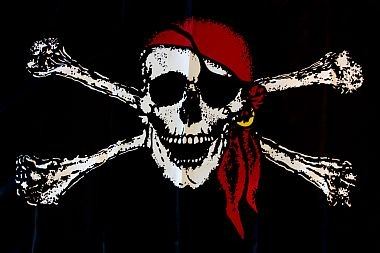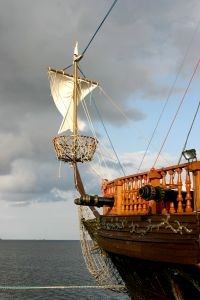Ah, who can resist the call of the pirate’s life. Yo ho, ho yo, right? I was surprised to find recently that, while The Princess Bride’’s Dread Pirate Roberts is clearly a fictional character, there really was a dreaded pirate Roberts who sailed the high seas in the early 18th century, looting and pillaging at his ease. Unlike Westley’s predecessor, this Roberts was named not Cummerbund but Bartholomew, an equally less-than-fear-inducing name (though somewhat more suitable when shortened to Bart). Piracy, as it turns out, wasn’t quite what our movies today make it out to be. In many ways, it was worse – Dread Pirate Roberts only killed the crews of the ships he plundered, while plenty of real pirates were notorious for their creative tortures, like slicing off a victim’s ears, frying them up, and forcing the victim to eat them. But in other ways, pirates’ lives were quite a bit better than our movies make out – they were free in ways few of their times were, and had developed laws and traditions that protected their freedoms as well as – if not better than – our modern Constitutional principles. In fact, there are quite a few things we can learn from the pirates of the 17th and 18th centuries. Like other organized criminals, pirates were consummate business people, whose taste for booty could only satisfied by shrewd thinking and practical action. Here, then, are six things the Dread Pirate Roberts might tell you if you hired him as a business consultant for your firm, or a life coach.
1. Your reputation precedes you.
What a coup for the Dread Pirate Roberts! Here he is, face-to-face with a farm girl-turned-princess, and he’s recognized instantly – despite the fact that nobody’s ever seen him and lived. That’s reputation, and in many ways, it’s the most important treasure. Pirates had a rough dilemma to face. They made their living by boarding and plundering merchant ships. Fighting too hard against those ships’ crews risked damaging the ship or its precious cargo – but not fighting hard enough meant most likely suffering defeat and not winning the prize at all. Pirates’ solution to this dilemma was clever – they let it be known that the crews of any ship that surrendered without a fight would be spared, unharmed – while every last man of a crew that resisted would be slaughtered, often viciously. With that kind of reputation, pirates rarely had to fight at all – most crews that came under assault by pirates surrendered immediately. Today, your reputation spreads more easily and more quickly than ever before – imagine what pirates could have accomplished with a service like RateMyPirate.com! A reputation for being effective and without qualms about doing what’s necessary can open a lot of doors.
2. Follow through on your promises.
A reputation for blood-thirstiness did pirates no good if they weren’t willing to actually be blood-thirsty when the occasion demanded. Every now and again, for whatever reason, a merchant captain and his crew would decide to press their luck in defense of their ship. In those cases, pirates usually won handily – they often outnumbered the crews of the ships they boarded as much as ten-to-one, their ships were faster and better armed, and in the end, they had little to lose. Once a crew decided the engage with pirates, there was no quarter – and no survivors. But the flip side of the promise had to be honored just as well – a crew that surrendered without a struggle had to be treated with the utmost courtesy, or merchant sailors would quickly learn there was no upside to surrendering. Pirates thus not only showed their captives the deepest respect, they often rewarded them with treasure from their own holds, and even recruited sailors to join their crews. Follow-through is crucial, for today’s business person as well as for the pirates of old. If you make a promise, be prepared to keep it, even when it’s impractical – or be prepared to pay the consequence as your reputation crumbles and more and more people feel comfortable challenging your word.
3. Distinguish yourself proudly.
The purpose of the Jolly Roger is simple: it let the crew of the ship under attack know that their boarders-to-be were pirates, and resistance would be severely dealt with. The Jolly Roger tied the pirate reputation for cruelty to the vessel about to overtake your own. It made plundering easy. But if flying the pirate’s flag made it easy to capture a ship without resistance, why didn’t military ships, coast guards, and privateers fly the same flag? The answer is that flying the Jolly Roger came with a price that few non-pirates could afford – you had to be willing to kill mercilessly to make good the promise of the Jolly Roger, should the enemy resist, and you had to be willing to face hanging if you were captured sailing under the Jolly Roger. Pirates showed few compunctions about torturing and killing a crew that gave them trouble, a level of blood-thirstiness few more legitimate raiders could stomach – especially as they often had to answer to authorities back home. And for a pirate, the penalty was the same whether they flew the Jolly Roger or not: death by hanging. For others boarding and plundering ships under government authorization, flying a pirate flag meant death if captured, while plundering under their own nation’s flag was legal (or nearly so). The high cost of hoisting the Jolly Roger made it uniquely pirates’ own, and was recouped many times over in booty taken with ease. Do you have a marker of excellence that others can’t afford? Producing a better product than anyone else, certification from third-parties, high-value clients and endorsements – these things are expensive to acquire and expensive to maintain, so display them proudly as marks of your excellence – and avoid or minimize those marks that anyone can achieve.
4. Be accountable.
Pirates lived under a code of democratic leadership that was virtually unheard of in the early 18th century. Captains were elected by popular acclaim, and quartermasters were appointed to act as a check on the captain’s power. To hold onto his position – and often enough his life – a captain had to be fair and even-handed with his crew, and vicious and extravagant with others when the situation called for it. A slip-up could lead immediately to a vote of no confidence and appointment of a new leader, with the old captain marooned on a deserted island with naught by a pistol, some shot and powder, and a jug of water to keep him company. To maintain transparency, captains often slept alongside their crews, ate the same food, and maintained an open-door policy in their cabins. Except in the heat of battle, the captain could expect to be questioned on every decision, so had better have had a good reason for all of them. Booty was often kept in unlocked chests in an open, public space aboard ship, to prevent an unscrupulous captains from self-dealing. This openness was crucial to pirates’ success. A captain’s crew, after all, served at their own will under great threat to their personal safety whether in battle or if captured. A captain’s accountability kept the crew satisfied and loyal, allowing the captain to pursue his goals and everyone to benefit. While today’s business leader might have a little more leeway in his or her behavior – he or she can’t be removed from their post quite so easily as the pirate captains of yesteryear, for one thing – embracing the pirates’ code of transparency cna go a long way towards running a tight ship, free of morale problems and unrpoductive strife.
5. Manage your personal brand.
One of the most fearsome names in pirate history was Edward Teach’s working name: Blackbeard. Blackbeard carefully cultivated his personal brand, braiding his long beard and hair to give himself a terrifying appearance, even to the point of working lit matches or fuses into his beard so that his head was wreathed in pungent smoke. No pirate’s name was ever so feared. In fact, so well did Blackbeard manage his brand that over the course of his career, he had not once been obligated to take a single life. Talk about faking it until you make it! The secret of Blackbeard’s success is his effective use of image and close attention to PR. His fearsome appearance, boasting, and determination put weight behind the pirate promise to give no quarter – so effectively, that he was never called on to prove it. That’s good branding!
6. Don’t be afraid to make enemies.
Finally, the most successful pirates always made it clear who their enemies were. Captains pit themselves against all merchants under a particular country’s or colony’s flag, often in response to the hanging of their colleagues, killing all crewmembers of a particular nation to demonstrate the cost of dealing harsh justice against pirates. Heavy-handed merchant captains were also targeted, with pirates often surveying the crew to determine how well they were treated and then torturing or killing their captain to punish wrongdoing. These personal vendettas and rogue administrations of justice helped pirates by solidifying support for them among at least a significant minority of non-pirate seamen. While the members of Spanish colonies might be terrified by a pirate who announced his intention to kill all aboard ships sailing from a particular Spanish port, English sailors might well be rooting him on! Likewise, sailors of all nations experienced the frustration, humiliation, and often degradation of working under an unfair and brutal captain – and may well have learned to view attack by pirates as a kind of liberation. This is as true of business – and other realms – today as it was of piracy then. Taking a strong stand against something or someone may well solidify your opposition, but it also solidifies your own core of support. Consider Apple. By taking on Microsoft so boldly in their “Mac and PC” ads over the last few years, they’ve certainly upset plenty of Microsoft employees and users, but they’ve also strengthened the tight-knit community of Apple users drawn as much by Apple’s “spunk” as by the design of their products.
A pirate’s life for you!
You would make a wonderful Dread Pirate Roberts. Just keep in mind these lessons from the world of piracy and see where they take you. For now, let’s say the black mask is optional. Avast!

